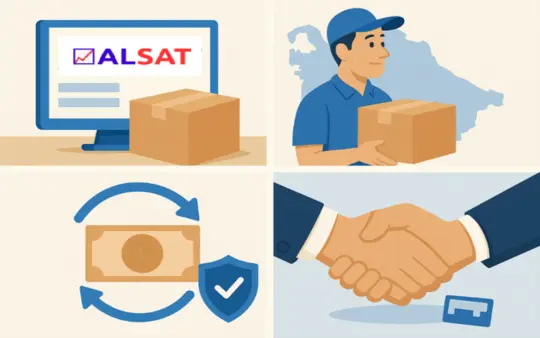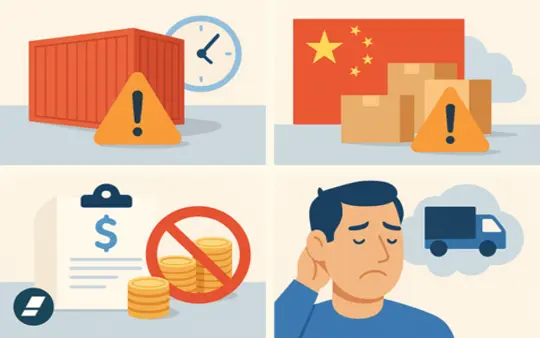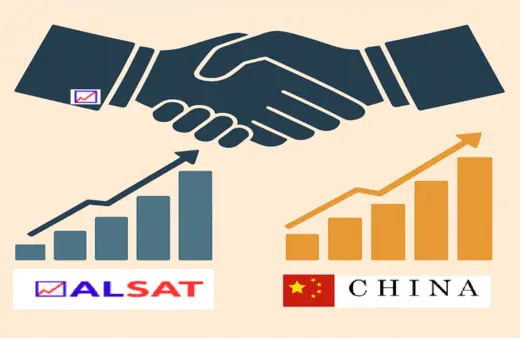✅ Advantages of the local platform 📈ALSAT:
In 2024, Turkmenistan received its first B2B marketplace 📈ALSAT. For local companies, this meant the emergence of a convenient online platform “nearby”.
Main advantages for buyers:

• 🚚 Fast delivery across the country. The goods are already inside Turkmenistan, in the warehouses of local enterprises. Instead of waiting by sea or rail for weeks, you can receive your order in a matter of days, or even hours (especially if the seller is from the same city). Local delivery reduces downtime - a critical factor when the goods are “needed yesterday”.
• 💳 Payment in manats without currency complications. Payments are made in the national currency through local banks. No need to look for dollars or yuan, worry about exchange rate differences and bank commissions for international transfers. For many Turkmen enterprises experiencing difficulties with currency conversion, this is a significant plus.
• 🛃 No customs barriers. For a domestic transaction, customs clearance and payment of duties are not required. All necessary taxes are already included in the price of the goods on the domestic market. The buyer avoids bureaucratic import procedures - saving time and money on logistics and brokers.
• 🔐 Transparency and security of the transaction. The platform operates with the support of the Union of Industrialists and Entrepreneurs of Turkmenistan, which increases trust. Each transaction is documented, 📈ALSAT guarantees the fulfillment of obligations and timely payment. It is easier for the buyer to defend their rights: the seller is their own, local company, which can always be contacted directly.
• 🛠️ Local service and warranty. If the product requires installation, service or warranty, the local seller will most likely provide support. In case of a defect, you can quickly agree on a replacement or return. For imported goods, there is often no official service center, and sending defective goods back to China is almost impossible.
⚠️ ALSAT limitations and disadvantages:

Of course, the local market has its limits. Firstly, the range is still inferior to global platforms. 📈ALSAT offers many product categories - from building materials to textiles - but this is exactly what is already in the warehouses of Turkmen companies. If you need highly specialized equipment or the latest model of equipment that has not yet been imported into the country, you may not find it on the platform. Secondly, delivery volumes are limited by local stocks. 📈ALSAT is great for purchasing small and medium-sized batches in bulk, but if you need a whole container of a rare product, you will probably still have to order it from abroad. Finally, the export aspect: purchases via 📈ALSAT are not intended for direct re-export. That is, 📈ALSAT is for now about the domestic market of Turkmenistan; those who plan to purchase goods and immediately send them abroad will have to separately resolve issues of certification and export documents outside the platform.
Direct import from China - a wide range of choice on expectation
🌏 Benefits of purchasing directly from China:
It is not surprising that Chinese goods have filled the local market - according to the UN, in 2023, Turkmenistan imported almost $1 billion worth of products from China. Working directly with Chinese suppliers promises buyers a number of benefits:
• 🛒 Wide range. China is the “factory of the world”. Almost any product - from machine tools and electronics to specific spare parts - can be found from Chinese manufacturers or on wholesale online platforms like Alibaba. What is not available locally is likely to be found in the vast expanses of the Celestial Empire. For narrow-profile needs, direct import is often the only option.
• 💰 Low prices with large volumes. By purchasing directly from the manufacturer, you bypass intermediary markups. Wholesale lots from China are usually much cheaper per unit than buying in small wholesale quantities from a local dealer. The larger the order volume, the lower the price; quantity discounts are often available. This is attractive for businesses planning large deliveries: single savings are multiplied by hundreds and thousands of items.
• ⚙️ Customization and choice of manufacturer. With direct contact, there is a chance to order products according to your requirements - for example, apply your brand or order goods according to specifications. You can choose from dozens of factories, compare reviews, request samples. This level of control over quality and branding is not available when buying from already imported goods on the domestic market.
⚠️ Disadvantages and risks of importing from China:

Behind the tempting price there are also costs that the buyer must take into account:
• ⏳ Long waiting time and logistics. Direct deliveries are not characterized by efficiency. Sea or land transportation from China to Central Asia takes an average of 4-8 weeks, or even longer if there are delays. Air delivery is faster (5-10 days), but costs several times more and is suitable only for compact and expensive cargo. In addition to the transit itself, time is spent on processing export-import documents, customs clearance, and possible downtime at the border. During these weeks, business needs may “cool down” or production may be put on hold.
• 💱 Currency transactions and prepayment. Chinese suppliers work for dollars or yuan, so a foreign currency payment abroad is required. For Turkmen enterprises, this means contacting a bank, collecting a package of documents - in a word, additional bureaucracy. Often, 100% prepayment is required, which diverts the company's working capital for months in advance. Any currency fluctuations during this time are a risk of budget overruns.
• 📦 Customs duties and fees. Import involves the payment of duties, VAT (if any) and customs clearance fees. These costs can offset the initial cheapness of the goods. You also need to include the costs of delivery to Turkmenistan, cargo insurance, brokerage services. All this increases the actual cost of the purchase.
• 🗣️ Language and cultural barrier. Despite globalization, no one has canceled language nuances. Negotiations, specifications and contracts are all in English or Chinese. Misunderstanding the subtleties can lead to errors in the order. For example, units of measurement or quality requirements can be interpreted incorrectly. In addition, differences in business culture: what is considered mandatory in Turkmenistan may be interpreted differently in China. Without experience and a reliable translator, conducting such negotiations is stressful for the buyer.
• 🚫Quality risk and lack of warranty. “A pig in a poke” is the eternal risk of remote transactions. You can receive a batch that differs from the samples, or discover a defect upon arrival. Returning goods to China is almost impossible: the cost of reverse logistics and customs will make this pointless. Warranty repairs are also problematic - you will either have to send the goods back at your own expense, or repair them yourself. In fact, when importing directly, the buyer bears all the risks after the seller sends the goods. Often, rumors about a favorable price are forgotten when some piece of equipment fails, and it can only be replaced by a repeat order from abroad.
🤔 How to make the right choice?
As you can see, both options have their niche. There is no universal answer - everything depends on the priorities and situation of a particular business. Below are some guidelines that will help buyers in Turkmenistan make a decision:

• 🟢When 📈ALSAT helps out:
If the goods are needed urgently or in small quantities, the local market is a salvation. For example, a construction company that suddenly runs out of cement will find a couple of dozen tons on 📈ALSAT from a neighboring supplier faster than waiting for months for a new wagon from China. Also, when warranty and service are important, it is worth checking local offers first. For small and medium businesses that do not have the resources for complex logistics, the simplicity and reliability of internal purchases outweigh a couple of percent of savings. In the end, equipment downtime due to waiting for a part is more expensive than any discount.
• 🔵 When direct import is justified:
Are you planning to stock up and can wait? Then direct delivery from China will reduce the cost. This is rational for large wholesale volumes for production or resale, when the benefits of scale are significant. Also, if a unique product or raw material is required that is not available on the domestic market, you cannot do without import. Large companies often combine approaches: first they test demand or cover the initial need through local sellers, and at the same time order the next large batch directly from the manufacturer. Thus, China is for strategic planning, 📈ALSAT is for tactical needs.
📌 In conclusion
For the Turkmen buyer, 2025 marks the emergence of a real alternative to traditional imports. Instead of depending on distant suppliers every time, businesses have received a local tool in the form of 📈ALSAT.com.tm Of course, direct contracts with China remain an important channel and, with the right approach, provide savings. But the advantages of a local platform - speed, confidence in payment and after-sales service, the absence of hidden barriers - often outweigh, especially for small and medium-sized businesses.

We can draw the following conclusion: 📈ALSAT and imports from China are not mutually exclusive, but complementary options. A smart buyer will first evaluate the local market: if the required product is available within the country and the price difference is small, it is more logical to buy locally and avoid unnecessary hassle. If the savings or uniqueness of the product are significant, then plan direct import, allocating time and resources for possible difficulties.
As a result, 📈ALSAT.com.tm can be considered as the first step before contacting foreign suppliers. The site does not cost anything to test - registration is free, the catalog is available online. Try looking in the desired category on 📈ALSAT right now: there is a high probability that the solution to your purchasing problem is already waiting for you within the country, without a multi-month marathon and currency risks. This approach will help businesses in Turkmenistan save time, focus on development and use imports from abroad where they really cannot be done without them.




